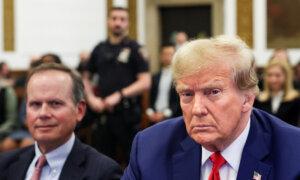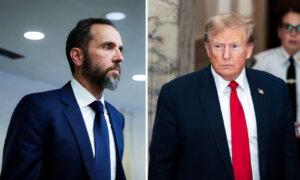President Trump’s attorneys argue that in 234 years of American history, no president has been criminally prosecuted.
Attorneys for former President Donald Trump filed an appeal with the Supreme Court on Monday, hoping to win a motion to dismiss one of the federal criminal cases against him on the basis of presidential immunity.
“Without immunity from criminal prosecution, the Presidency as we know it will cease to exist,” they argued.
In a 100-plus page filing, defense attorneys requested the Supreme Court issue a stay on the lower court decision, pending a review from the high court. Prosecutors have demanded that district court proceedings resume while President Trump pursues avenues of appeal.
“President Trump’s claim that Presidents have absolute immunity from criminal prosecution for their official acts presents a novel, complex, and momentous question that warrants careful consideration on appeal,” the appeal reads.
They asked that the stay be extended until the Supreme Court has reviewed the case, and also stayed in the event of a petition for a rehearing in the appeals court, something the appeals court expressly did not grant in its own order.
“This order departs from the D.C. Circuit’s ordinary procedures,” the attorneys added.
The lawyers make the case that the Supreme Court grant the appeal, and review the case, because it involves an important area of law not yet settled by the court.
“The public importance of Presidential immunity cannot be overstated,” the appeal reads.
‘Cycles of Recrimination’
President Trump’s attorneys argue that in 234 years of American history, no president has been criminally prosecuted, and for good reason. To set such a precedent would open the floodgates, they say.
“If the prosecution of a President is upheld, such prosecutions will recur and become increasingly common, ushering in destructive cycles of recrimination,” they argued.
“The threat of future criminal prosecution by a politically opposed Administration … will hang like a millstone around every future President’s neck, distorting Presidential decision-making, undermining the President’s independence, and clouding the President’s ability ’to deal fearlessly and impartially with’ the duties of his office.’”
Last year, President Trump was charged with and pleaded not guilty to four counts of conspiracy and obstruction over his actions on Jan. 6, 2021. He has since filed four motions to dismiss the case, the first of which is based on presidential immunity.
Supreme Court Previously Rejected Case
The case, prosecuted by special counsel Jack Smith, has been on hold in federal district court since mid-December, and is no longer on track for a March 4 trial before Super Tuesday.
After U.S. District Court Judge Tanya rejected a motion to dismiss the case based on presidential immunity, President Trump took the case to appeals court, halting the case. Prosecutors had made several moves to fast-track the appeal, hoping to still try the case in the current term, before the general elections.
Immediately after the appeal, Mr. Smith’s team asked the appeals court to expedite the process and filed a petition with the Supreme Court to weigh in on the use of presidential immunity.
The appeals court agreed to expedite, and requested the parties file their opening briefs during the holidays. In early January, a three-judge panel heard arguments, and less than a month later rejected President Trump’s use of presidential immunity.
Meanwhile, the Supreme Court rejected the case without comment.
Presidential Immunity
During former President Richard Nixon’s time in office, a civil lawsuit brought by a laid-off contractor made its way to the Supreme Court and set the standard for the “absolute immunity” a president enjoys.
The rationale was that if presidents could be sued in a personal capacity for perhaps unpopular policy, it would undoubtedly “diminish” the office of the president.
But there is no such immunity for presidents for criminal prosecutions, making President Trump’s defense untested legal territory.
The parties disagree on the interpretation of presidential immunity, as they have disagreed on the intentions of President Trump on Jan. 6.
Attorneys for President Trump are arguing that the former president had taken several actions in his official capacity to investigate allegations of election fraud, and these official actions cannot be subject to prosecution.
For instance, some of the actions President Trump was charged for are communications he made in the form of public statements, with Justice Department officials, or with the vice president.
They have argued that many past presidents undertook official acts with troubling results—such as a military strike that inadvertently killed an American citizen—and faced no prosecution as a private citizen because these were acts of the office of the president.
Prosecutors argue that crimes committed during the time when a president was in office are not the same as the shield of immunity from civil lawsuits brought by citizens affected by policy. This is a case of the former, they argued, and subject to prosecution.
On Feb. 6, a federal appeals court panel rejected President Trump’s defense, noting that presidents are subject to penalties if they commit federal crimes, impeachment being but one vehicle for correction. President Nixon had been given a pardon, an action that would not have been necessary if he was absolutely immune in relation to criminal issues.
This upheld a district court ruling that presidents don’t have immunity from criminal prosecution, whether or not the acts were official.
Original News Source Link – Epoch Times
Running For Office? Conservative Campaign Consulting – Election Day Strategies!


